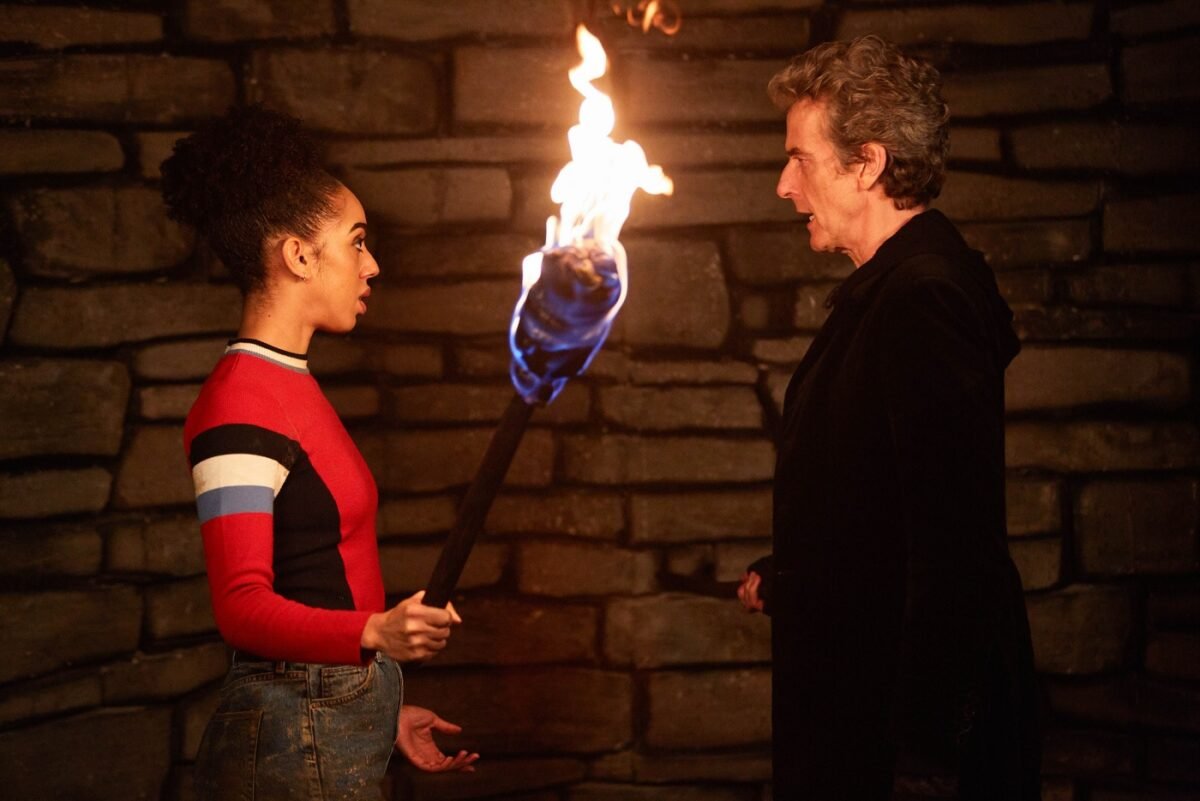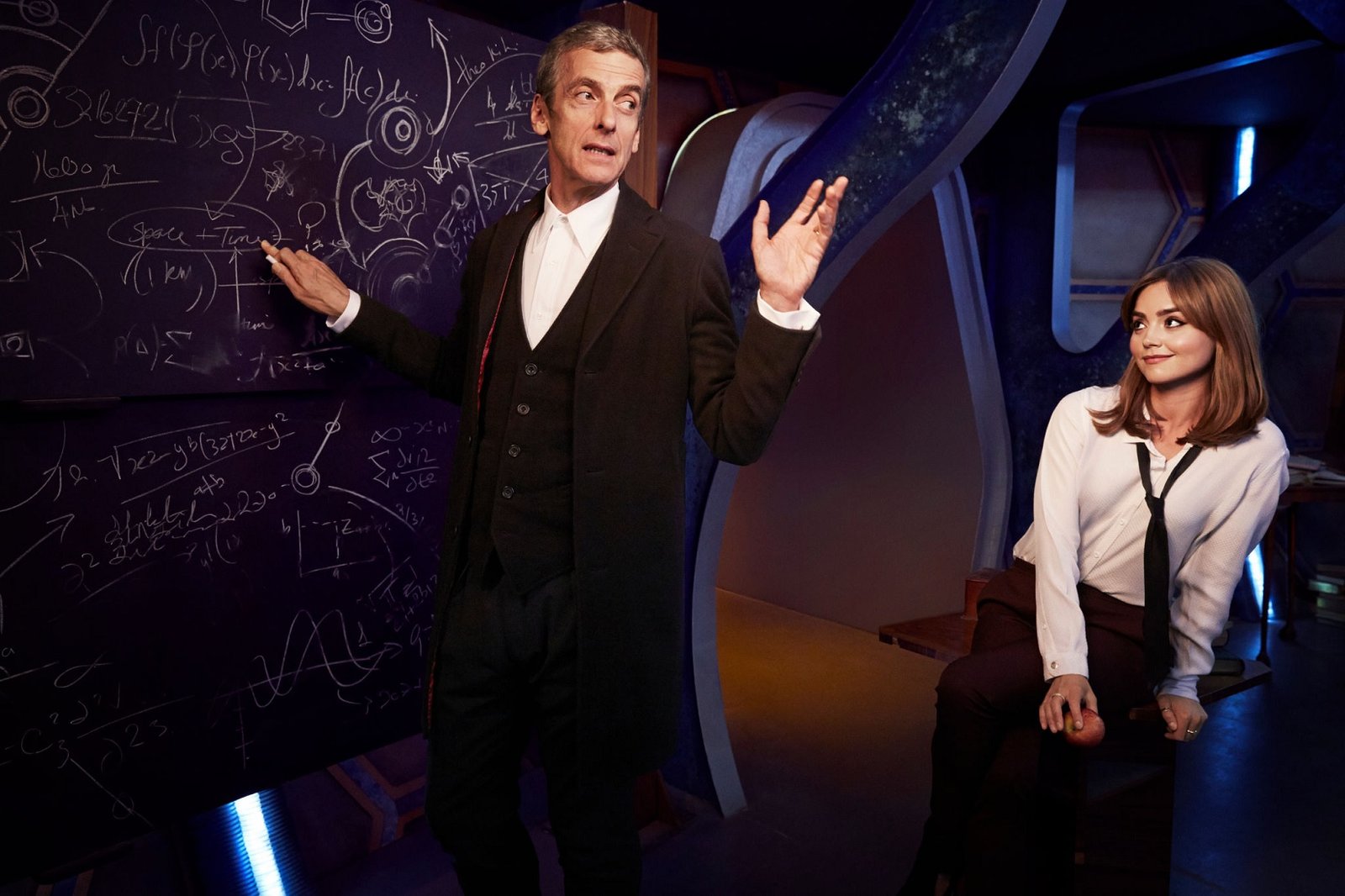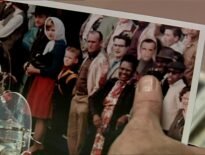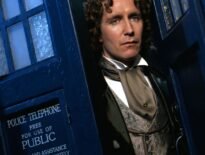When the new, 2005 era of Doctor Who arrived, ushered in by old/new showrunner Russell T Davies, I enjoyed Christopher Eccleston’s portrayal of a very damaged and vulnerable Time Lord. No. 9 was not your typical incarnation, but before we could even settle in, he was gone, replaced by some bloke with new teeth.
Very quickly, I found I preferred this Tenth incarnation though, as David Tennant brought a different energy, goofiness, and a volcanic anger to the table, with a tiny bit of Tom Baker in the performance. Tennant had grown up on ‘70s and ‘80s Who, and it showed. Turns out, knowing the history of the show inside out added a different dimension to playing the part.
But Matt Smith upended the game board. By coming in so young, he’d known very little of the history. After landing the part, he did his homework — as you should –, fell in love with Patrick Troughton’s portrayal of the Second Doctor — as you do — and added a bit of him into his own performance. By approaching the role from a completely different angle, I found that, once again, I enjoyed this incarnation even more than the last. Surely, this better than the last, better than the last trend couldn’t last? And yet…
Peter Capaldi’s Twelfth Doctor came in bold, blunt, and unapologetic. He was 2,000 years old. He was once known as the Doctor of War, and he owned it. He wasn’t here to play games, and if something wasn’t important or interesting to him, he’d delete it from his brain. When formulating plans against enemies, he often kept his cards close to his vest, often ruffling the feathers of everyone around him, who wondered if he was either a monster or an idiot. Clara Oswald didn’t realise how easy she had it with the Eleventh Doctor. He put her up on a large pedestal. The Twelfth made her carry it around on her back.
Capaldi’s Doctor was critical and accountable. Everyone including him had to be held to a higher standard, and he was unafraid to throw anyone and everyone into the deep end. He didn’t suffer fools at all. Nor banter. He had no problem making the hard decisions, but if the safety of your planet was hanging in the balance and a decision had to be made, whether it dealt with your moon cracking open, or a leviathan in the Thames, he referred to you, boss.

His visual acuity or lack thereof was one of this Doctor’s more distinctive characteristics. Initially, he could see no real visual difference between Clara and Strax. He thought the very act of changing your coat disguises one completely. He didn’t necessarily see what’s on the outside of a person, just what’s on the inside, if he actually took the time to really look at you. So even if you couldn’t see him, he could see you. He could certainly see Clara and had great affection for her:
“Do you think I care for you so little that betraying me would make a difference?”
He got so excited when there was something he simply didn’t know! He wanted to revel in that moment of ignorance because it was so rare. After 2,000 years, he’d pretty much seen and done it all. But he tried to do better. He wondered if he was a “good man”, but was happy to realise he was neither good nor bad — just an idiot, who tried to keep doing his best.
Capaldi’s first series was a joy, because the Doctor was mostly the opposite. A refreshing grump, who had to battle quasi-living machines, a good Dalek, Robin Hood (with a spoon), and prove the existence of a theoretical species. He also initiated a Time Heist, went under deep cover as a janitor (different coat), discovered the moon is actually an egg, had to unravel a mummy murder mystery, battle one-dimensional aliens, and figure out what’s up with all the trees. All the while, Clara was right there with him, and, frankly, usually looking fantastic.
But then there was the uncomfortability. Danny Pink. Clara demanding the Doctor solve the moon problem for her. Fighting. Anger. More Danny Pink. The sands shifting under the viewers’ feet, as we fell out of our comfort zone. Fans weren’t really used to the show taking those type of risks, but Moffat didn’t shy away. The squabbling between Danny and the Doctor, with Clara in the middle. The Doctor making no effort to hide his dislike for soldiers to a man like Danny, who’d been suffering from his own PTSD. Clara, whose lying and risk taking — her addiction — were an ever growing problem.
And the season culminated in the return of the Master, albeit regenerated into female form, played by Michelle Gomez as Missy. Unlike the unhinged John Simm incarnation before her, or the Sasha Dhawan rabid dog version after, Gomez played an intense, erratic, eccentric, and funny version of the villainous Time Lady. And in Last Christmas, we saw a suspenseful, meticulously crafted tale involving Santa Claus and Dream Crabs. It’s fun, it’s horror, it’s Christmas, it’s Doctor Who.
After a disappointing showing in Series 7B, Jenna Coleman was considering leaving the show after Series 8. But the chemistry with her new Doctor and story changed everything, urging her to stay on, and I’m ever so glad she did.
Going into Series 9, when the Doctor received his Confession Dial (a last will and testament), he partied like it was 1099, but he knew something was coming. With Danny gone (hey, he stayed dead!), there was less and less to keep Clara grounded in the regular world, and she dove even deeper into her adventures with the Doctor — again, her addiction. She couldn’t help herself, but as we moved through the stories, she helped the Doctor with flash cards so as to brush up on better words and reactions in social situations dealing with a crisis.

Capaldi is an accomplished guitarist and has a lot of fun with the axe through Series 9. Of course, an older guy playing guitar — heaven forfend, some people couldn’t get behind something that crazy (!), but certain Doctors had various real life interests, like Jon Pertwee had gadgets and vehicles, or yes, Sylvester McCoy had the spoons. The guitar wasn’t that much of a stretch.
Speaking of crazy, some people couldn’t accept the idea of sonic sunglasses. I myself loved it, and they made just as much sense, if not more so than a sonic screwdriver. At least with the glasses, you had a visual component to work with, in addition to all the million other uses of the sonic. Fans in this day and age: stubborn and intolerant about a wearable tech upgrade? Oh, sometimes, I just shake my head.
But taking on Davros, the Fisher King, Lady Me, Zygons, or even that nefarious sleep dust you might wake up with in the corner of your eyes… they all failed to match the insidious evil of the Time Lords themselves and their little Confession Dial/torture chamber. Although I wasn’t quite sold on the sudden urgency of the threat of the Hybrid, Heaven Sent was not only truly one of the best hours of the Capaldi era, but of all Doctor Who EVER. Face the Raven, and Heaven Sent/ Hell Bent were really an amazing three part experience. Keeping a secret to protect Clara for 4.5 billion years because…
“I had a duty of care.”
That was pretty much the ultimate. Even after decades as a Who fan, my love for the show had never been stronger. Clara and Me might still be out there somewhere. No, Clara couldn’t stay dead, but honestly, when the story is good, I don’t care what they do.
Now, it was my impression that at this point, Steven Moffat had done his time for five seasons over six years, and he was considering moving on. But right then, the Beeb was bereft of a replacement, so Moffat was going to be sticking around — we’d be getting a conclusion to River Song’s story, a gap year, then Moffat’s take on Superman. What came next was unexpected.
Steven Moffat basically rebooted the show as a perfect jumping on spot for new viewers, and once again delivered an all new and different season to what had gone before, yet still very Doctor Who.
When we come back to the Doctor, we find out that he’d been teaching at university for half a century, keeping his best frenemy in a vault below, and had re-assembled his man-servant, Nardole. The Doctor then took an interest in young Bill Potts, who asked a lot of good questions.
Much like when the Tenth Doctor took on Donna Noble as a companion, Bill represented real people, not an “Impossible Girl” or some glamorous supermodel. This new trio was quite lovely, with one of the more compelling sets of interpersonal dynamics.

Bill really kept the Doctor honest. From pointing out that the initials of TARDIS don’t really make sense, to angrily confronting him about just how much death he’s had a hand in during his 2,000 years, and how he could possibly calmly move on.
“I don’t have the luxury of outrage.”
Opposing more killer robots, god-like water creatures, unscrupulous millionaires, alien monks, future corporations, blindness, Ice Warriors, other-dimensional carnivores, Mondasian Cybermen, and Missy and the Master, the Doctor had his hands full as he neared his end. Finally, he had a one-on-one with his first incarnation, convincing each other the importance of continuing the fight. A brilliant season to end Capaldi’s run.
Of course, going in, there was some very mild outrage, with some thinking the show was getting all “woke”, and “forcing” it on the viewers. I, of course, disagree, as I think Moffat introduced topics and handled things pretty well. Could he have handled it better? Maybe. But in the end, when it came to bringing Doctor Who into the 21st Century, I think both Davies and Moffat at least did a good job, without constantly hitting us over the head with preachy messages. But then again, they’re two of the finest writers the show’s ever had, and even slightly addressing certain topics can be a powder keg where some are never satisfied. I myself, though, found Bill to be a triumph. Nardole too, for that matter.
(I also found it very interesting that at the end of The Doctor Falls, in the TARDIS, the Twelfth Doctor is on the edge of regeneration, and mentally sees not only past companions from his era, but all the new eras. Almost as if it were the end of Doctor Who itself, or at least the entire new era, from 2005 through 2017. Curious.)
I think the Capaldi era might even age better than any of the other new Doctor’s. He presented a flavour of the classic version mixed with the new. After all, he was 5 years old when he watched An Unearthly Child when it was first aired, back in 1963. He’d been there from the beginning, so he brought a unique perspective when playing the role. Arguably, no one was more in tune with the show, and his incarnation had quite the journey through three seasons and four specials.
For all these reasons and more, Peter Capaldi is my favorite new era Doctor.


